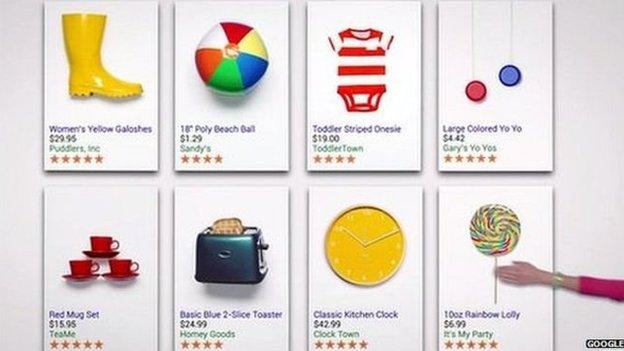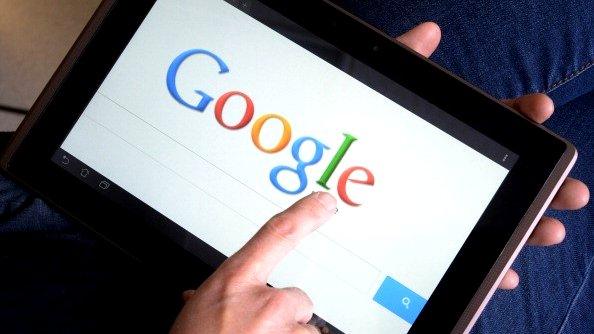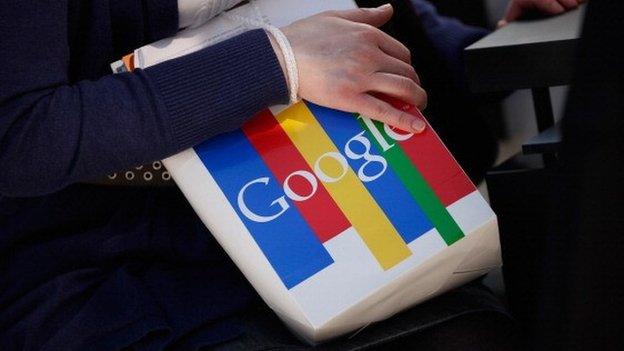EU wants iPlayer access extended across Europe
- Published

At present iPlayer users need to be in the UK to stream videos to the app
EU officials want the public to be able to continue using catch-up services, such as the BBC's iPlayer and Sky's Now TV, as they travel across Europe.
The proposal is part of a wider-ranging European Commission initiative for a "digital single market", external.
The regulator says it wants to boost the use of online goods and services by introducing new rules.
But the technology industry has warned that some of the suggested changes could undermine that goal.
The measure affecting internet catch-up services would become possible thanks to a pledge to reduce the differences between national copyright laws.
"The Commission wants to ensure that users who buy films, music or articles at home can also enjoy them while travelling across Europe," it said in a statement.
"The Commission will also look at the role of online intermediaries in relation to copyright-protected works.
"[And there will be] a review of the Satellite and Cable Directive to assess if its scope needs to be enlarged to broadcasters' online transmissions and to explore how to boost cross-border access to broadcasters' services in Europe," the Commission added.
The BBC confirmed it would look into the possibility of easing its iPlayer restrictions.
"We note the Commission's interest in making services more portable to UK users while temporarily travelling in Europe, and will begin work to look at the technical and legislative implications," said a spokesman.
As part of its wider plan, the Commission also announced it had launched a new anti-trust competition inquiry, external into the 28-nation bloc's e-commerce sector.

Commissioner Gunther Oettinger says he wants the EU's citizens to make full use of the potential of new digital services and goods
It said it wanted to tackle anti-competitive measures taken by retailers and manufacturers that prevented customers in one country from buying electronics, clothing, shoes and other goods from online stores available elsewhere in the EU.
In particular, the regulator said it wanted to see an end to "unjustified geo-blocking".
This is a measure that either denies a user access to a site based on their location or re-routes them to a related store that features different prices.
The Commission highlighted instances of car rental companies using the practice to charge different countries' citizens different prices when they booked in advance for the same destination.
Search engine inquiry
The Commission also announced a new inquiry into the role that search engines, app stores and social media networks play in the digital market.
"This will cover issues such as the non-transparency of search results and of pricing policies, how they use the information they acquire, relationships between platforms and suppliers and the promotion of their own services to the disadvantage of competitors," the Commission said.
"It will also look into how best to tackle illegal content on the internet."
This is likely to prove a fresh headache to Google.

Google was already facing a separate investigation into its shopping service
The US search giant is already dealing with the EU's earlier accusation that it had abused its dominance of internet searching by promoting its own shopping adverts above others.
"Breaking down barriers to online trade across Europe will improve consumer choice, increase investment, create jobs and spur economic growth. We're committed to playing our part," the firm said in a statement.
The new investigation is also likely to affect Apple, Facebook, Amazon, Twitter and Microsoft's Bing, among others.
The Computer & Communications Industry Association, which represents many of the large tech firms, external, has expressed concern.
"We support the overall recognition by European leaders that the internet is the way forward for Europe's economy and society," said the CCIA's vice president James Waterworth.
"However, there are several measures that threaten to undermine the stated goal of the digital single market to grow Europe's economy, replacing it with a re-regulation agenda.
"Existing measures to respond to problems online strike a balance between freedom of speech, commercial freedom and controlling infringing material. Extending a 'duty of care' could severely affect these freedoms," Mr Waterworth added.
Earlier in the year, President Obama also suggested that the EU sometimes took steps that deliberately discriminated against US tech firms, even if that was not the stated aim.
"Sometimes the European response here is more commercially driven than anything else," he told the news site Recode, external.
"Oftentimes what is portrayed as high-minded positions on issues sometimes is just designed to carve out some of their commercial interests."
Action plan
In total, there are 16 separate aims set out in the digital single market strategy, which the EU says it wants to deliver by the end of 2016.
Other pledges include:
Reducing restrictions on the "free flow of data". The Commission says some services are hampered by current rules that force firms to store files at specific data centres for reasons unrelated to protecting people's personal information.
An effort to offer EU shoppers similar rights when they buy goods online.
Steps to cut the cost of cross-border parcel deliveries to help encourage shoppers to buy goods from online stores outside their own country.
Measures to make it easier for businesses to handle different VAT sales taxes.
Countries' adoption of compatible IT systems, so that businesses and members of the public only have to send in relevant data once, rather than submitting the same information multiple times to different government bodies.
Although the Commission has given itself less than two years to complete its plan, it could take significantly longer for Europe's citizens to experience the promised changes, since national governments and the European Parliament will also need to have their say.

The European Commission wants to ease some of the restrictions on where data is stored
The Commission is also working on separate measures to clarify the situation regarding net neutrality, external - rules governing if and when broadband and mobile network providers can discriminate between online services using their infrastructure.
A spokeswoman told the BBC more information about the EU's Building a Telecoms Single Market strategy would be released later this year.
- Published15 April 2015

- Published15 April 2015
